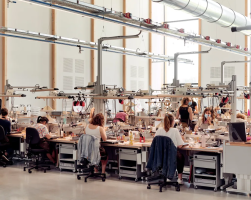“The house of Dior firmly condemns these unworthy acts, which contradict its values and the code of conduct signed by these suppliers. They do not reflect the reality of the work of its artisans and the long-lasting links which exist with Italy,” it said.
“No new order will be made in the future with these suppliers. The Dior teams are working intensely on ongoing reinforcements of the existing procedures. Despite regular audits, these two suppliers had evidently succeeded in hiding these practices,” Dior added.
Dior’s reputation has been tarnished by reports last month that some of its products were made in sweatshop-like conditions and that some of its bags cost just 53 euros to assemble, while retailing in the region of 2,600 euros.
The French luxury house disputed the information.
“Certain articles mention entirely false facts, firstly in indicating that the suppliers in question produced women’s handbags when they were solely participating in the partial assembly of men’s
leather goods; and secondly that the production costs of these bags are ridiculously low. It should be noted that the profit margin of the house of Dior is entirely in line with that of the luxury industry and nothing of the order indicated by these erroneous comments,” it said.
“Dior will follow the evolution of its artisanal products — notably the integration of production into its own ateliers — and will continue to offer the best working conditions to all who contribute, with immense commitment and remarkable know how, to create the finest quality Dior products,” it added.
The house noted that it has worked with the largest Italian suppliers for more than 30 years, contributing to the creation of 4,000 jobs.



